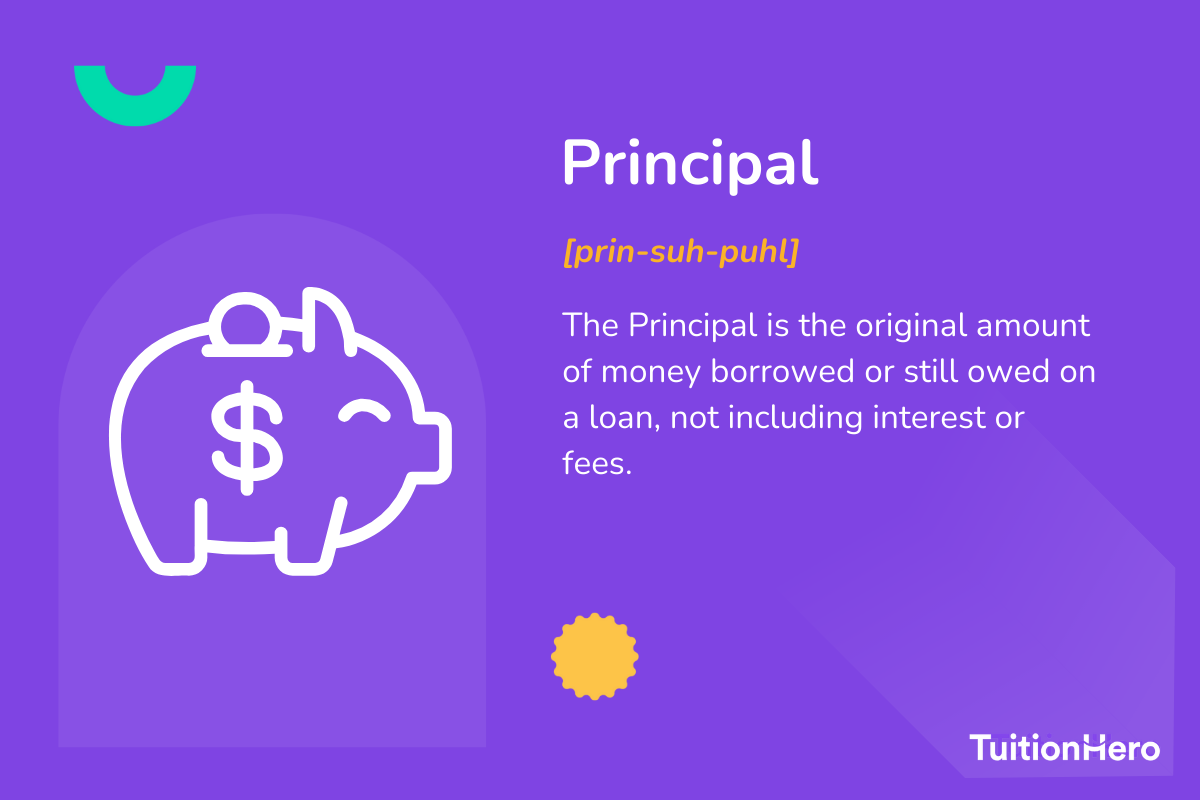Advertiser Disclosure
Last update: November 16, 2024
7 minutes read
What Does Principal Mean on a Student Loan?
Ever wondered what principal on a student loan means? Learn how it shapes your repayment journey and savings.

By Derick Rodriguez, Associate Editor
Edited by Brian Flaherty, B.A. Economics
Learn more about our editorial standards



By Derick Rodriguez, Associate Editor
Edited by Brian Flaherty, B.A. Economics
Learn more about our editorial standards
In the world of student loans, understanding terms like principal can feel like deciphering an ancient code. What does principal mean on a student loan, you might ask? Knowing the difference between principal, interest, and how they affect your repayment can save you a lot of money down the line. In this post, you'll learn about the principal amount's role in your student loan and how it affects your financial journey. For those considering refinancing, checking out student loan refinancing options can provide more clarity and opportunities.

Key takeaways
- Principal amount refers to the original sum borrowed before interest
- Making payments above the minimum can reduce the principal faster and save on interest
- Extra payments should ideally go towards the principal to curtail overall loan costs
What does principal mean on a student loan?
When we talk about the principal on a student loan, we're referring to the original sum of money borrowed before any interest is added. This is the base amount you agree to pay back upon taking out the loan.
Over time, as you make payments, this principal amount decreases, signaling you're closer to being debt-free. In simple terms, think of it like this:
- The principal is like the core of your debt.
- A portion of every payment you make chips away at this core amount.
- Lowering the principal faster can significantly reduce how much interest you pay over time.

Understanding the principal is essential because it's the part of your loan that interest calculations are based on. The sooner you can decrease this amount, the less interest you'll end up paying.
When I was in college, I was lucky to have loans that did not accrue interest while I attended. Because I worked throughout college, that means I was able to pay down some of the principal of my loans while still in school. This strategy reduced my total interest paid over the life of the line.
This is why extra payments towards your student loan should ideally target the principal amount. For insights into managing your student loans better, explore how student loans work.
Continuing from our deep dive on principal and its effect on student loans, let's explore more aspects that affect how you manage and understand your student debt. Knowing these facets helps streamline your repayment strategy to potentially save a large amount of money over the loan's life.
How do interest rates affect your loan?
Interest rates play a pivotal role in determining the overall amount you'll pay back. Interest costs are based on your interest rate and the principal amount of your loan, which means the lower your principal, the less interest you'll accrue over time.
Interest rates and repayment:
- A higher interest rate increases the total amount you owe.
- Making payments above the minimum can reduce the principal faster, therefore saving on interest.

TuitionHero Tip
For a closer look at how managing your loan's principal can influence the interest accrued, consider reading about lines of credit and student loans. Plus, understanding how student loans affect credit scores might offer insights into the broader financial implications of your debt.
How does repayment term length influence your loan?
Repayment term length is another crucial factor affecting both your monthly payments and the total interest paid over the life of your loan.
Shorter vs. longer repayment terms:
- Shorter terms mean higher monthly payments but less interest over time.
- Longer terms offer lower monthly payments but result in more interest paid overall.
Maximizing your understanding of the relationship between term lengths, principal, and interest can lead to big savings. For strategies on freeing up more cash to make loan payments, exploring top ways to save money in college can be beneficial.
Does making extra payments help?
Extra payments can greatly change the course of your loan repayment. By directly targeting the principal, you can reduce the amount of interest that accrues, shortening the overall term of your loan.
Benefits of making extra payments:
- Reduces the total interest paid.
- Shortens the loan repayment period.
Knowing when and how to make extra payments can be a game-changer in managing student loans effectively. Interested people can further explore what making a lump sum payment means for their loans.
Federal vs. Private loans: What's the difference?
Federal and private loans differ greatly in terms of interest rates, repayment options, and forgiveness programs.
Key differences to note:
- Federal loans typically offer lower interest rates and more flexible repayment options.
- Private loans might require payments while still in school and usually lack forgiveness programs.
Understanding these differences is crucial for making informed borrowing decisions. You can find information about qualifying for each type of loan by exploring what defines an independent student in the context of student loans.
In student finance, keeping informed about how factors like principal, interest rates, and loan types affect your debt can empower you to make smarter financial decisions. Whether you're just starting your college journey or are deep into repayment, it's never too late to gain control over your student loans.
How student loans impact financial health
Understanding the broader implications of how student loans influence your overall financial health is crucial. Engaging with this knowledge allows for more strategic financial planning and can prevent unexpected stress on your budget.
Key points of impact:
- Student loans can affect your ability to qualify for other lines of credit.
- Proper loan management can positively affect your credit score.
If you’re looking to balance your student loans with other financial goals, exploring how student debt affects qualifying for a business loan could provide valuable insights.
Compare private student loans now
TuitionHero simplifies your student loan decision, with multiple top loans side-by-side.
Compare Rates
Dos and don'ts of making extra payments on your student loan
Making extra payments on your student loan can be a powerful strategy to reduce your overall debt faster. However, it's crucial to approach this decision with a clear understanding of the best practices and potential pitfalls. The following outlines some key dos and don’ts when it comes to making extra payments.
Do
Do apply extra payments directly to the principal.
Do check with your loan servicer about how to apply extra payments.
Do consider refinancing for a better rate, if you qualify.
Do keep track of your loan balance and payments.
Don't
Don't neglect other financial goals or emergency savings.
Don't assume extra payments automatically target the principal.
Don't ignore the terms of your loan agreement.
Don't make extra payments if you're facing financial hardship.

Advantages and disadvantages of making extra payments on student loans
Making extra payments on your student loan can be a big decision that affects your finances both now and in the future. It's important to weigh the benefits against the potential downsides to ensure this strategy aligns with your overall financial plan.
- Faster debt reduction: By increasing your payment amount, you can shorten the loan term and become debt-free sooner.
- Interest savings: Extra payments reduce the principal balance faster, resulting in less interest paid over the life of the loan.
- Improved credit score: Successfully managing and reducing debt can positively affect your credit by lowering your debt-to-income ratio and showing a history of reliable repayment.
- Increased financial freedom: Reducing debt levels can free up more money for other investments and savings goals.
- Potential for financial strain: Allocating extra money towards student loans may limit cash flow for current expenses or other savings goals.
- Lost opportunity costs: The money used for extra payments could potentially yield a higher return if invested elsewhere, depending on interest rates and market conditions.
- Lack of flexibility: Once an extra payment is made, those funds are no longer available for unexpected financial needs or opportunities.

Why trust TuitionHero
TuitionHero simplifies college finance for students and parents. We show how income affects things like student loans and scholarships. We provide personalized advice and tools to help you make informed decisions. Let us help you manage your income to maximize your education investment and secure a brighter financial future.
Frequently asked questions (FAQ)
Yes, making extra payments on your student loan can have a positive effect on your credit score. Making reliable and steady repayments improves your payment history, which increases your credit score. Reducing your overall debt-to-income ratio can also improve your chances of qualifying for other loans, even if that ratio doesn’t impact your credit score directly.
If you find yourself in a situation where making extra payments isn’t possible, focus on meeting your minimum monthly payment to avoid penalties and negative effects on your credit score. Explore options like income-driven repayment plans or deferment, and consider consulting with our team at TuitionHero to strategize your approach to student loan management.
To ensure that your extra payments are applied directly to the principal of your student loan, contact your loan servicer to specify how the extra payment should be handled. Provide clear instructions and check your loan statements to verify that payments have been applied as intended. Educating yourself on the mechanics of loan payments through TuitionHero can also equip you with the knowledge to navigate these discussions confidently.
Final thoughts
Understanding the concept of "principal" in the context of student loans is a big step towards financial literacy and independence. Recognizing how this crucial element interacts with interest rates, repayment terms, and more payments opens up pathways for smarter financial decisions.
At TuitionHero, we're committed to guiding you through these tough decisions by giving you access to valuable resources and support systems like scholarship opportunities. Remember, managing student loans isn’t just about making payments; it's about strategic planning and making each dollar count toward your educational and financial goals.
Source
Author

Derick Rodriguez
Derick Rodriguez is a seasoned editor and digital marketing strategist specializing in demystifying college finance. With over half a decade of experience in the digital realm, Derick has honed a unique skill set that bridges the gap between complex financial concepts and accessible, user-friendly communication. His approach is deeply rooted in leveraging personal experiences and insights to illuminate the nuances of college finance, making it more approachable for students and families.
Editor

Brian Flaherty
Brian is a graduate of the University of Virginia where he earned a B.A. in Economics. After graduation, Brian spent four years working at a wealth management firm advising high-net-worth investors and institutions. During his time there, he passed the rigorous Series 65 exam and rose to a high-level strategy position.
At TuitionHero, we're not just passionate about our work - we take immense pride in it. Our dedicated team of writers diligently follows strict editorial standards, ensuring that every piece of content we publish is accurate, current, and highly valuable. We don't just strive for quality; we aim for excellence.
Related posts
While you're at it, here are some other college finance-related blog posts you might be interested in.
Shop and compare student financing options - 100% free!

Always free, always fast
TuitionHero is 100% free to use. Here, you can instantly view and compare multiple top lenders side-by-side.

Won’t affect credit score
Don’t worry – checking your rates with TuitionHero never impacts your credit score!

Safe and secure
We take your information's security seriously. We apply industry best practices to ensure your data is safe.
Finished scrolling? Start saving & find your private student loan rate today





